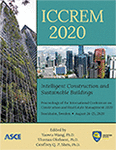International Conference on Construction and Real Estate Management 2020
Have the Ideas Been Deliberated or Dictated? Group Decision Making in Construction Project Management
Publication: ICCREM 2020: Intelligent Construction and Sustainable Buildings
ABSTRACT
Group decision making has been commonplace in construction projects for deliberating ideas among different experts, thereby minimizing their judgmental errors via reasoning with others. Thus, it is important to understand how group members construe a problem and attain consensus on solution. This research investigates the influence of group setting in decision making and thus, how members may fall into the pitfall of group pressure namely groupthink bias. It focuses on procurement committee which is peculiar in large private enterprises or public sector, to understand the groupthink phenomenon, extending to defective decision making in procurement. A research model is developed and tested via structural equation modeling statistical analysis technique. This research found that groupthink may magnify its influence on members of procurement committee though they are operating on stringent procedures. Implication of procurement committee setting is discussed.
Get full access to this article
View all available purchase options and get full access to this chapter.
REFERENCES
Barnlund, D.C. (1959). “A comparative study of individual, majority, and group judgment.” Journal of Abnormal and Social Psychology, 58(1), 55-60.
Bernthal, P.R. and Insko, C. A. (1993). “Cohesiveness without groupthink: the interactive effects of social and task cohesion.” Group and Organization Management, 18(1), 66-87.
Bone, J., Hey, J. and Suckling, J. (1999). “Are groups more (or less) consistent than individuals?” Journal of Risk and Uncertainty, 18(1), 63-81.
Carron, A.V., Bray, S.R. and Eys, M.A. (2002). “Team cohesion and team success in sport.” Journal of Sports Sciences, 20(2), 119-126.
Creswell, J.W. (2014). Educational research: planning, conducting and evaluating quantitative and qualitative research, Pearson, London.
Dyaram, L. and Kamalanabhan, T.J. (2005). “Unearthed: the other side of group cohesiveness.” Journal of Social Science, 10(3), 185-190.
Fellows, R.F. and Liu, A.M.M. (2018). “Where do I go from here? Motivated reasoning in construction decisions.” Construction Management and Economics, 36(11), 623-634.
Festinger, L., Schachter, S. and Back, K. (1950). Social pressure in informal groups, Harper and Row, New York.
Fischhoff, B. and Johnson, S. (1997). Organizational decision making, Cambridge University Press, Cambridge.
Goldstein, A.P., Heller, K. and Sechrest, L.B. (1966). Psychotherapy and the psychology of behavior change, Wiley, New York.
Goldstein, H. (1977). Policing a free society, Ballinger Publishing, Cambridge.
Hair, J.F.J., Hult, G.T.M., Ringle, C.M. and Sarstedt, M. (2017). A primer on partial least squares structural equation modeling (PLS-SEM), Sage Publication Ltd, London.
Hathaway, P. (2008). “Groupthink phenomenon and self-esteem in bureaucracies: A comparison between private and public sector organizations.” Dissertation Abstracts International, 69(4), 118A.
Henningsen, D.D., Henningsen, M.L.M., Eden, J. and Cruz, M.G. (2006). “Examining the symptoms of groupthink and retrospective sense making.” Small Group Research, 37(1), 36-64.
Herek, G.M., Janis, I.L. and Huth, P. (1987). “Decision making during international crises: is quality of process pelated to outcome?” The Journal of Conflict Resolution, 31(2), 203-226.
Hui, W.S., Othman, R., Omar, N.H., Rahman, R.A. and Haron, N.H. (2011). “Procurement issues in Malaysia.” International Journal of Public Sector Management, 24(6), 567-593.
Isenberg, D.J. (1986). “Group polarization: a critical review and meta-analysis.” Journal of Personality and Social Psychology, 50(6), 1141-1151.
Janis, I.L. (1972). Victims of groupthink, Houghton Miffin, Boston.
Janis, I.L. (1982). Groupthink: psycological studies of policy decisions and fiascos, Houghton Mifflin, Boston.
Kleindorfer, P., Kunreuther, H. and Schoemaker, P. (1993). Decision sciences: an integrative perspective, Cambridge University Press, Cambridge.
McCauley, C. (1989). “The nature of social influence in groupthink: compliance and internalization.” Journal of Personality and Social Psychology, 57(2), 250-260.
McCauley, C. (1998). “Group dynamics in Janis’s theory of groupthink: backward and forward.” Organisational Behaviour and Human Decision Processes, 73(2/3), 142-162.
Ntayi, J.M., Byabashaija, W., Eyaa, S., Ngoma, M. and Muliira, A. (2010). “Social cohesion, groupthink and ethical behaviour of public procurement offciers.” Journal of Public Procurement, 10(1), 68.
Riordan, D. and Riordan, M. (2013). “Guarding against groupthink in the professional work environment: a checklist.” Journal of Academic and Business Ethics, (7), 1.
Schafer, M. and Crichlow, S. (1996). “Antecedents of groupthink: a quantitative study.” The Journal of Conflict Resolution, 40(3), 415-435.
Smith, C.A. (2004). Groupthink: the Effects of Leadership, Group Insulation, and Information Availability. Lamar University-Beaumont, Texas, America.
Solomon, M. (2006). “Groupthink versus the wisdom of crowds: the social epistemology of deliberation and dissent.” The Southern Journal of Philosophy, 44(S1), 28-42.
Tenenhaus, M., Esposito Vinzi, V., Chatelin, Y.M. and Lauro, C. (2005). “PLS path modeling.” Computational Statistics and Data Analysis, 48(1), 159-205.
Tubbe, R.L. (2010). A Phenomenological Study to Determine the Extent and Consequences of Groupthink among the Management Team of an Acute Care Organization. University of Phoenix, Arizona, USA.
Wagner, C.G. (2006). “Thinking more clearly about the future.” The Futurist, 40(5), 10.
Wetzels, M., Schroder, G. and Oppen, V. (2009). “Using PLS path modeling for assessing hierarchical construct models: guidelines and empirical illustration.” Management Information Systems Quarterly-MISQ, 33(1), 177-195.
Information & Authors
Information
Published In
ICCREM 2020: Intelligent Construction and Sustainable Buildings
Pages: 445 - 452
Editors: Yaowu Wang, Ph.D., Harbin Institute of Technology, Thomas Olofsson, Ph.D., Luleå University of Technology, and Geoffrey Q. P. Shen, Ph.D., Hong Kong Polytechnic University
ISBN (Online): 978-0-7844-8323-7
Copyright
© 2020 American Society of Civil Engineers.
History
Published online: Oct 14, 2020
Published in print: Oct 14, 2020
Authors
Metrics & Citations
Metrics
Citations
Download citation
If you have the appropriate software installed, you can download article citation data to the citation manager of your choice. Simply select your manager software from the list below and click Download.
